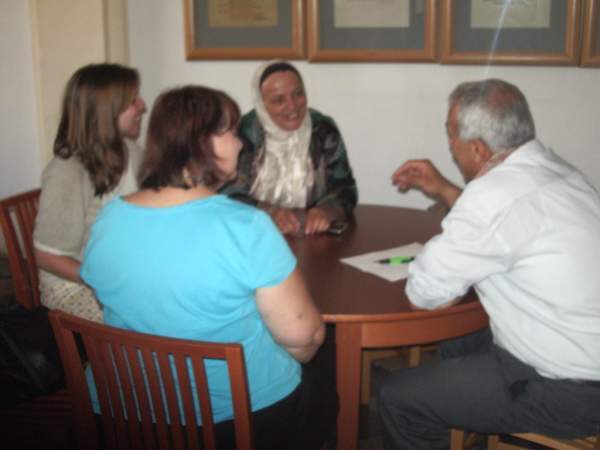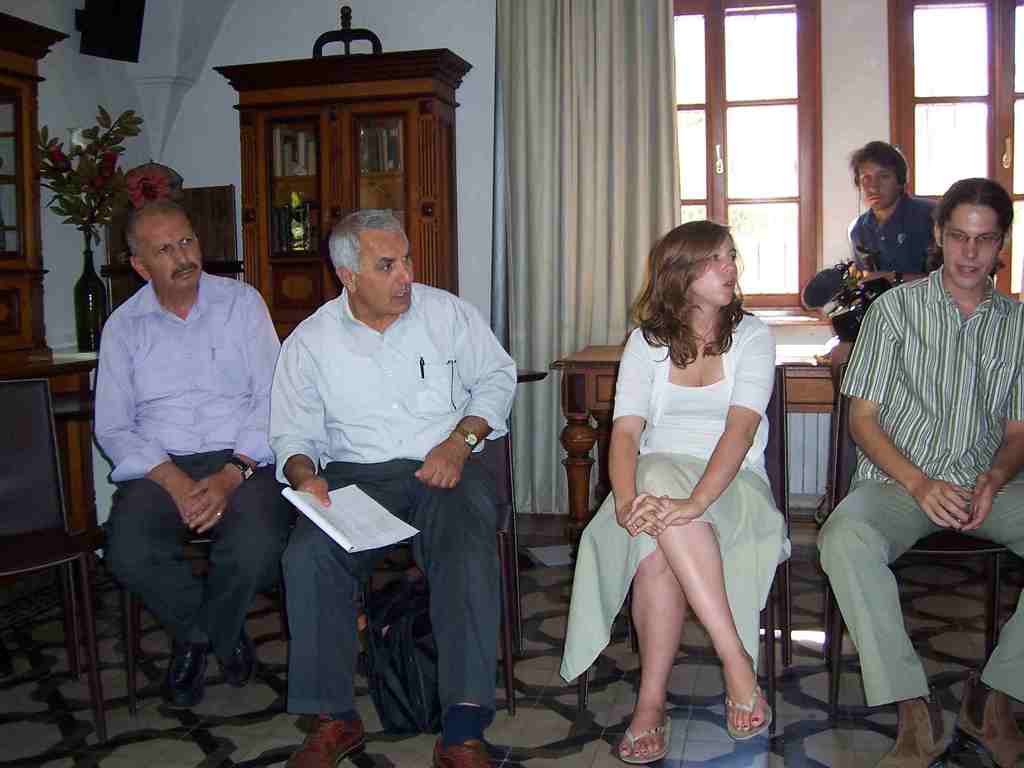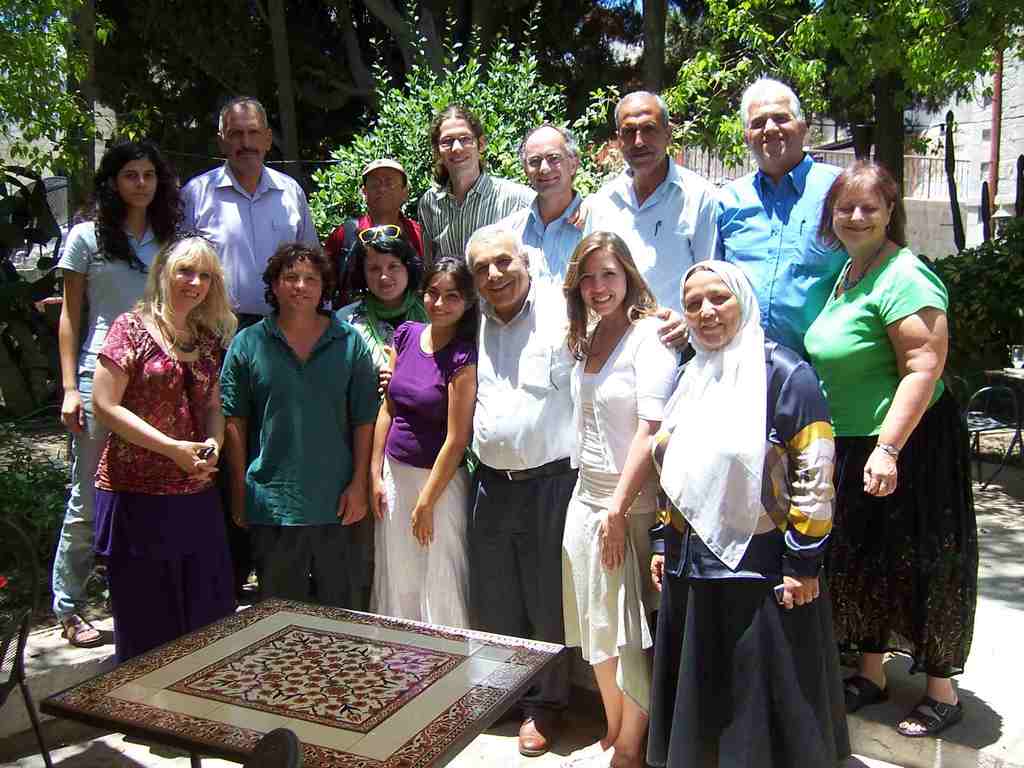By Dr. Yehuda Stolov | Executive Director
Our Father Abraham – Father of Monotheism in Judaism, Christianity and Islam
A joint retreat of Palestinian Peace Society and Interfaith Encounter Association
The 25th Israeli-Palestinian retreat of interfaith encounter started on Thursday, July 16, 2009, in the charming and tranquil guesthouse of the Austrian Hospice, at the heart of the Old City of Jerusalem. We were a highly mixed group of Israeli Jews of different levels of practice, Palestinian Muslims and International Christians of different denominations – Catholic, Protestant and Orthodox. We began by introducing the two organizations – by their directors: Dr. Taleb Al-Harithy of the Palestinian Peace Society and Dr. Yehuda Stolov of the Interfaith Encounter Association. We also introduced the program and the guiding principles for the retreat. Then we briefly introduced ourselves in the plenary and split into small groups for more in depth personal introductions. Beyond the sharing biographical details we also shared with each other ways in which Abraham is meaningful and inspiring to us, as a way to deepen the way we get to know each other and at the same time start the conversations about the theme of the retreat.
The first session focused on the Jewish perspective. The short presentation was delivered by Dr. Yehuda Stolov, who used the nice summary of Rabbi Yehezkel Abramsky. Abraham was born in the year 1948… to the Hebrew calendar (on which now the year is 5760). He was born and raised in Mesopotamia, in a society that heavily worshiped idols. Abraham thought from an early age that this could not be the real worship and made a lot of intellectual and spiritual effort to discover the real God, until finally God revealed himself to him. His love to God derived love to all his creatures and his main way to bring people closer to God was through his amazing hospitality, open to all. After the person ate, drank and rested and wanted to thank him – he would direct them to the real source of the good things they got, God. For Abraham – belief in God was the ultimate key for peace, as no nation would attack another if they really understood that God is the real source of what they will have. Abraham became a famous leader in his generation and it is interesting to note that according to Philo of Alexandria, Abraham invented writing. After he discovered God he started to combat idols and promote the worship of God. His father Terah had an idol shop and when he left it under Abraham's care – he smashed all of them but the biggest, and put the stick in his hand. When his father returned he said the big idol smashed the others. This was told to Nimrod the king and he through him to a burning oven – but God saved him. God ordered him to go to the land that at that time started being invaded buy the Canaanite tribes. Hi relations also with them were very good and when needed he protected them – both his sward, for example when the four Mesopotamian kings captured his nephew Lot; and by his prayer, when God decided to destroy Sodom and Gomorrah. His 100th year was eventful: at 99 he was ordered to circumcise himself and Ishmael, argued with God trying to save Sodom and Gomorrah and had his second son Yitzhak, who was the main continuation, according to the Jewish tradition, of Abraham.
Following the short presentation, participants went to their small groups for a more personal and in-depth conversations around the theme and derived issues, as they did in the following sessions. These group conversations are the heart of the retreat's experience and process.
In the morning Dr. Karam Nasreddeen presented the Muslim perspective. Most of the stories were exactly the same as the Jewish stories. He added the description of Abraham's way to Monotheism. He saw a star and said this is the God to worship but then the star disappeared so he knew it was not. This repeated with the son, the moon etc. until he realized the God who created all of them. Abraham was born in Iraq and then lived in Arabia with his wife Hagar and their son Ishmael. He left both of them in the desert without explanation and in the fourth day Angel Gabriel knocked with his foot on the ground – and Ein Zamzam started to give water, and still does so today. The tribes around came to Hagar for the water and she allowed them to use the spring in return to their protection. Abraham and Ishmael built the Qaaba in Mecca. Abraham wandered to southern Syria (=the Holy Land) and lived between Beer Sheba and Hebron. Lut's people lived not far in 7 towns and the three angels came as men dressed in white to inform Abraham about God's decision to destroy the area. Abraham is most important in Islam. One of the biggest Suras of the Quran is dedicated to him and he is called the father of all prophets.
Ms. AnnMarie Micikas presented the Christian perspective. Abraham is mentioned 234 times in the Old Testament and 72 times in the New Testament. Abraham is in the middle of the faith chain. In Protestantism especially salvation is by faith rather than by action and Abraham is significant as he is the first person who was saved by faith. By having faith everyone can become the son of Abraham. He is also special for forming the covenant with God that does not depend on human deeds. For Christians the most important story is the sacrifice of Isaac as this is parallel to the sacrifice of Jesus. And the understanding of the great difficulty for Abraham to sacrifice Isaac makes us understand how difficult it was for God to sacrifice Jesus. Abraham did not finally sacrifice Isaac, but he did sacrifice his final decision of what's the right deed. Even though Abraham was not perfect and did make mistakes – still he is called the friend of God and the whole world is blessed through him.
In the moving concluding session many of the participants pointed out their surprise from how harmonious the conversation went. Many expected confrontation but the interfaith encounter approaches directed the conversation to be of dialogical nature.
Project reports on GlobalGiving are posted directly to globalgiving.org by Project Leaders as they are completed, generally every 3-4 months. To protect the integrity of these documents, GlobalGiving does not alter them; therefore you may find some language or formatting issues.
If you donate to this project or have donated to this project, you can receive an email when this project posts a report. You can also subscribe for reports without donating.
Support this important cause by creating a personalized fundraising page.
Start a Fundraiser

